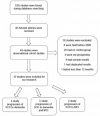Subjective cognitive decline as a predictor of future cognitive decline: a systematic review
- PMID: 32973979
- PMCID: PMC7500809
- DOI: 10.1590/1980-57642020dn14-030007
Subjective cognitive decline as a predictor of future cognitive decline: a systematic review
Abstract
Over 44 million people suffer from dementia around the world. Researchers estimated that there will be 48.1 million people with dementia by 2020 and 90.3 million by 2040. In addition to dementia, mild cognitive impairment (MCI) and subjective cognitive decline (SCD) relate to cognitive impairment. It has been established that MCI precedes dementia, however the significance of SCD is still unclear. Recent studies suggest that SCD could be a risk factor for objective cognitive impairment. SCD is defined as а self-estimated decline in cognitive capacity in comparison to an individual's previous level of functioning, which cannot be determined by neuropsychological tests.
Objectives: To perform a systematic review of prospective longitudinal cohort studies that assessed the risk of MCI and dementia among people with SCD.
Methods: A search was carried out for all available peer-reviewed articles in English related to SCD in PubMed and PsychINFO databases from database initiation through January 2020. The keywords used for the search were 'subjective cognitive (or memory) impairment (or decline or complaints)'. Three authors separately determined the inclusion or exclusion of all articles retrieved for full-text evaluation.
Results: The chance of progression to dementia in the SCD group was 2.17 (95% confidence interval [95%CI] 1.53‒3.07; p<0.05) compared to normal aging. Furthermore, the SCD group was 2.15 times more likely to progress to MCI than the group without SCD (95%CI 1.39‒3.30; p=0.005).
Conclusions: SCD might precede cognitive impairment, however, more detailed longitudinal studies should be conducted.
Mais de 44 milhões de pessoas sofrem de demência em todo o mundo. Pesquisadores estimam que haverá 48,1 milhões de pessoas com demência até 2020 e 90,3 milhões até 2040. Além da demência, o comprometimento cognitivo leve (CCL) e o declínio cognitivo subjetivo (DCS) estão relacionados ao comprometimento cognitivo. Foi estabelecido que o CCL precede a demência, porém a significância do DCS ainda não é clara. Estudos recentes sugerem que o DCS pode ser um fator de risco para comprometimento cognitivo objetivo. DCS é definido como um declínio auto-estimado da capacidade cognitiva em comparação com o nível anterior de funcionamento do indivíduo, que não pode ser determinado por testes neuropsicológicos.
Objetivos: Realizar uma revisão sistemática de estudos prospectivos de coorte longitudinal que avaliaram o risco de CCL e demência entre pessoas com DCS.
Métodos: Foram pesquisados todos os artigos revisados por pares disponíveis em inglês relacionados com DCS nos bancos de dados PubMed e PsychINFO desde o início do banco de dados até janeiro de 2020. As palavras-chave utilizadas para a pesquisa foram “declínio cognitivo (ou de memória) subjetivo (ou comprometimento ou queixas)”. Três autores determinaram separadamente a inclusão ou exclusão de todos os artigos que foram recuperados para avaliação em texto completo.
Resultados: A chance de progressão para demência no grupo com DCS foi de 2,17 (intervalo de confiança de 95% [IC95%] 1,53‒3,07; p<0,05) em comparação ao envelhecimento normal. Além disso, o grupo com DCS teve 2,15 vezes mais chances de progredir para CCL do que o grupo sem DCS (IC95% 1,39‒3,30; p=0,005).
Conclusões: o DCS pode preceder o comprometimento cognitivo, no entanto, estudos longitudinais mais detalhados devem ser realizados.
Keywords: Alzheimer disease.; aging; cognition; cognitive dysfunction; dementia.
Conflict of interest statement
Disclosure: The authors report no conflict of interests.
Figures
References
LinkOut - more resources
Full Text Sources






